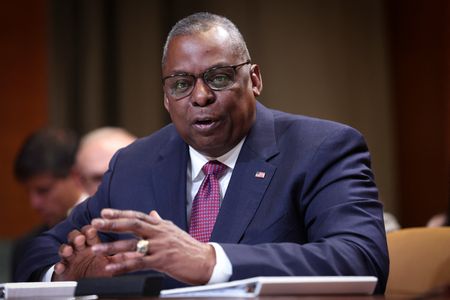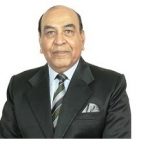AUSTIN’S VISIT TO ISRAEL : ADVICE ON TRANSFORMING THE WAR IS SANE AND SAGE LIKE
- January 3, 2024
- Posted by: admin
- Category: Israel

Lt Gen Syed Ata Hasnain (Retd)
When a man as experienced as Lloyd Austin talks about war and its strategic linkages the world needs to perk up and take note. Austin is not a political US Defence Secretary but a hard-core military one who has seen more hybrid war conditions and the resultant effects of those than what many can boast of. So, when Austin recently flew into Israel on his second visit after commencement of the Israel Hamas war on 7 Oct 2023, it was to take stock and give some sage advice to Israel on how the war it was fighting needed to be transformed. There is nothing new in this. He who fights war as a response to as dastardly an attack as the one the Hamas executed in South Israel in the Kibbutz Be’eri area, will never be able gauge the intensity with which to fight as there is little concern for the nature of targets and objectives. Strategic victory is the last thing on the minds of that nation; the obsession is revenge or retribution without remorse. Vengeance is good as a driver for war but only up to a point. Beyond that, unless strategic and tactically rational steps are adopted the war may not go the way intended or fetch the desired results. Austin’s visit and his many deliberations with the Israeli leadership was designed to convey just this because 10-11 weeks after conflict initiation a ‘stand back’ view from Washington would have revealed that the war is not heading towards the strategic result that both the US and Israel, and much of the world actually desire. That result or objective is the complete dismantlement of the Hamas infrastructure and enablers which allowed it to conceive, plan and execute a war which it thought could spark an international crisis of such proportions that the strategic impact would not be at the battlefronts but in the important capital cities of the multitude of stakeholders. This needs a deeper analysis with the question – how else can Israel handle this?
For the US, Israel is its strongest peg in the Middle East, notwithstanding differences of opinion from time to time. The US is aware that if it has to battle the rise of China in the Indo Pacific it cannot do so without the balance that Israel provides in the Middle East, to which the US seems to be continually pulled back from event to event. An average of 3 billion US$ worth of military aid has been extended to Israel annually over the last couple of years. The US may invest in many of the pro-US sheikhdoms or in Saudi Arabia’s future ideological transformation but it is aware that the journey is yet strewn with challenges. The post Cold War process of US confrontation with extremist Islamist forces intensified after 9/11 and has not died down; it is in partial hibernation. California University Professor Vinay Lal, writing in the Indian Express of 21 Dec 2023 states – “ In an extraordinary demonstration of just how rock solid American support of Israel is, Biden took the risk of travelling to Israel and the media was awash with pictures of Biden consoling ordinary Israelis. The US for weeks thereafter vetoed every single resolution in the United Nations calling for cease fire”. The solidity of backing may have been perceived as a must for a period when Israel’s emotional intelligence as a nation had been shaken. A dilution in support at that time would have been misperceived. More level-leaded thinking thereafter has adequately revealed that adopting its current strategy in perpetuity Israel can only head towards a strategic defeat. Any pragmatic military mind will tell you that hybrid wars (or for that matter any war) are not won by attempting to pulverize your adversary and eliminate the last man carrying a weapon, nor by an uncaring attitude towards those who are innocent and victims of the collateral. ‘Surgical’ is the answer but that is a challenge and requires a huge quantum of actionable intelligence (including human intelligence) , something in which Israel appears to have invested little. With all its reputed capabilities of having the finest intelligence services, things appear to have been relegated and a refurbishment could take a generation or more. In losing 1200 innocents in the 7 Oct 2023 surprise Hamas attack Israel could obviously not have sat still; a response was inevitable and justifiably so. However, Israeli military commanders are also aware that the nature of response will dictate how and when the Israeli nation should expect peace to prevail. The longer the response remains in the same mode of vengeance, unmindful of the collateral, the longer will Israel live without peace. This could stretch into a couple of generations. This is not a phenomenon without precedence. Conflict initiation always draws intense response; it happened with the Indian Army in Kashmir too. Without the intensity of that response India would surely have been at the receiving end much longer. However, the security system recognized the need for tapering as the situation progressed and executed it, leading to a situation years later where bold political decisions could be taken by the Central Government.
Kashmir and the Hamas-Israel war are like apples and oranges; incomparable. It’s in military terms that we seek some comparison. The Indian Army’s resort over time to intelligence based surgical operations paid dividends. This was backed by one of the most humanitarian oriented operational philosophies which have many times been ‘pooh-poohed’ by some military quarters. It is my opinion that the decision to hold back, taken by a few generations of Indian military leaders, is what delivered the dividend and enabled the Central Government to take a bold decision on 5 Aug 2019 and stick by it.
Austin’s clear military thinking advised that “Israel needed to establish humanitarian corridors and a defined set of rules to protect Palestinian civilians. The Israel Defence Forces should carry out a targeted precision air campaign, with limited numbers of special operations troops on the ground to act quickly on intelligence leads about the location of senior Hamas leaders”. That is how hostages will be saved and support from moderate Arab regimes will be afforded. Without them on its side Israel should expect a wider war and greater self-attrition; phenomena which will not facilitate even temporary peace.
No one denies Israel’s massive challenge and the need for deterrence of such Hamas like acts in the future. Part of the deterrence may have been achieved through the response over the last few weeks. However, the continuation of this strategy will only fetch diminishing returns. This is what Lloyd Austin had come to convey and do so in his characteristic quiet style. I am sure Austin would have also examined the Hezbollah threat and the support extended by Iran and Syria to Hamas. He must remain engaged on these threats if this has to be ‘package advice’. The US State department must also remain in constant touch with Saudi Arabia and the UAE. How it looks at the Hamas leadership residing in Qatar and the support that Hamas drew from some nations will also be a part of the configuration which doubtlessly the US has to keep in mind, making the situation far greyer than what appears at first sight.
What is in this for India is important. An early end to the war is in our earnest interest so that various initiatives which have been under initiation over the last few years can be brought to fruition; the U2I2 group and the India-Middle-Europe -Economic Corridor are on priority. The longer this war persists the greater risk it bears for our economy which is currently at a sweet spot with energy resources and price management both under control. Austin’s advice to Israel is for the common good of India, US and Israel. A war reduced to lower intensity, less vengeful against the civil populace and more humanitarian in approach with reference to innocents, will reduce the chances of things going over the top and give some miniscule chance for a larger peace.


Lt Gen Syed Ata Hasnain (Retd)
AUTHOR
Lt Gen Syed Ata Hasnain (Retd), PVSM, UYSM, AVSM, SM, VSM* former Commander of Indian Army’s Srinagar Corps, focuses on trans-national and internal conflicts in Asia and the Middle East with particular emphasis on issues revolving around radical Islam. He is the Chancellor of Central University of Kashmir and speaks extensively at Indian and international institutions on a wide variety of subjects revolving around strategic affairs and leadership. He is presently a Member of the National Disaster Management Authority (NDMA).
